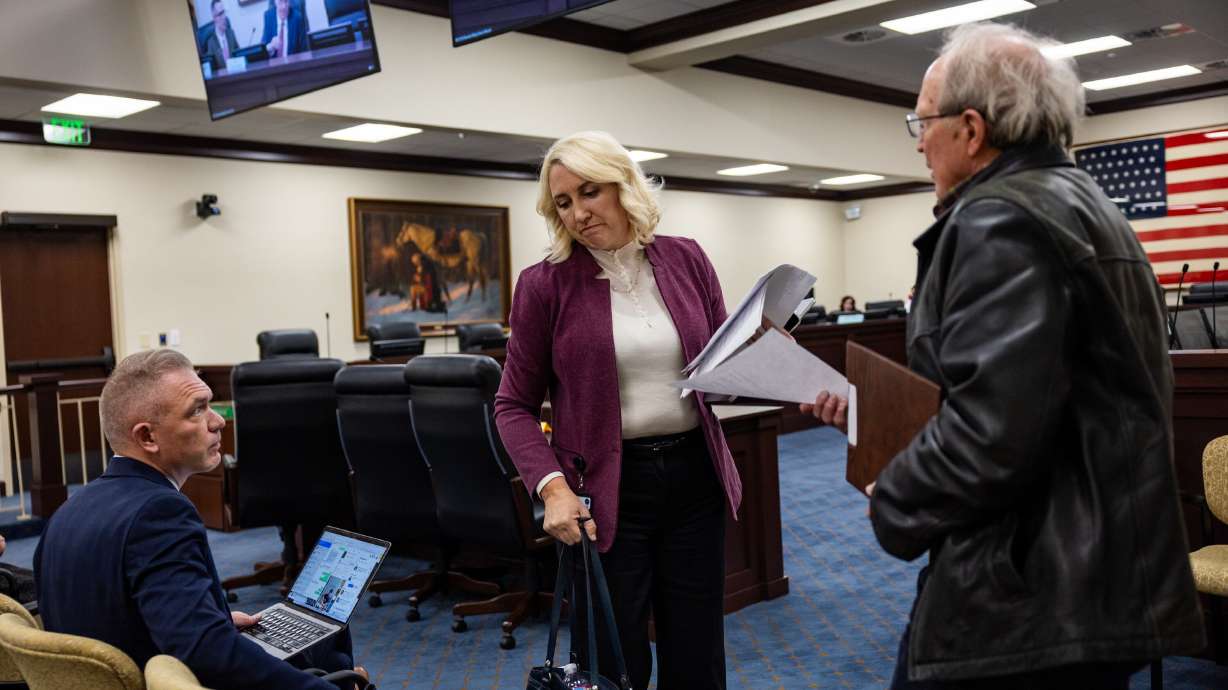Estimated read time: 3-4 minutes
- Utah lawmakers debated HB252, addressing transgender inmates' housing and medical care.
- The bill would restrict transgender-related health care initiation in custody but allow preexisting treatments to continue.
SALT LAKE CITY — On Friday, the Utah Legislature discussed where to house transgender people while they're in state custody. The same day, around 100 people were at the state Capitol to protest the legislation.
The bill, HB252, sponsored by Majority Whip Karianne Lisonbee, R-Clearfield, aims to regulate the medical care and housing conditions of people in state custody, which includes prisons, jails, and juvenile justice and youth services. It also modifies laws related to sexual relations between staff workers and inmates, increasing the age range of "youth receiving state services" from 21 to 25 to further protect inmates.
The House Judiciary Committee advanced the bill 8-2 after a nearly 30-minute discussion among committee members and public comment. Salt Lake County Democratic Reps. Verona Mauga and Grant Miller opposed it.
The bill does not appropriate any new funds and would take effect on May 7 if approved by both the full Senate and House.
What does HB252 address?
The bill says an inmate does not have the right to initiate specific treatments relating to transgender health care while in state custody. Those treatments include cross-sex hormone treatment, primary sex-characteristic surgical procedures and secondary sex-characteristic surgical procedures.
However, if an individual received medical treatment prior to being put in state custody, those treatments can continue, Lisonbee confirmed Friday. She also said the bill encourages psychotherapy, among other mental health treatments, for inmates experiencing gender dysphoria and mental health conditions.
The bill also requires designated housing arrangements for juvenile inmates based on sex, a requirement Miller said he found concerning given his experience working with transgender adults and minors housed in secure care. He said he saw firsthand the emotional and physical toll their housing situation took on them, which was the leading reason he voted against the bill.

"Being a teenager is hard enough, and being a teenager in secure care is a particularly precarious situation for any," he said. "I can only imagine (the) difficulties. For example, a trans female minor being housed with just young males. I think that presents a meaningful safety issue."
In response, Lisonbee said that in her efforts to prevent future litigation surrounding accommodation, she has worked closely with the Department of Corrections to ensure that inmates "succeed" as they serve their sentences no matter their circumstances.
"We absolutely want to help our inmates at the prison or county jails address their medical needs, overcome addictions, get mental health treatment," she said.
That being said, "Correctional facilities are a fundamentally unsuitable environment for inmates to make potentially permanent medical decisions such as hormone therapy or surgeries, especially at taxpayer expense. Those kinds of treatments can create new challenges for prison operations, inmate privacy, staff safety and more," she said.
Legal matters concerning transgender individuals remain a highly debated issue at both the state and federal levels.
On his first day in office, President Donald Trump signed an executive order titled "Defending Women From Gender Ideology Extremism and Restoring Biological Truth to the Federal Government," which ultimately removes men who "self-identify" as women from living in women's spaces and "ensure that no Federal funds are expended for any medical procedure, treatment, or drug for the purpose of conforming an inmate's appearance to that of the opposite sex," per the order.

Public response to the bill
During the public response in the House Judiciary Committee meeting, April Gardner said while she was grateful to Lisonbee for not completely barring transgender healthcare, she said she believes the bill creates a disparity between inmates.
"I really feel that this is a deeply harmful bill because it assumes that we are judging who is truly trans based on whether or not they've already managed to get treatment" prior to being put under state custody," Gardner said.
The bill will be heard next in a Senate committee.










